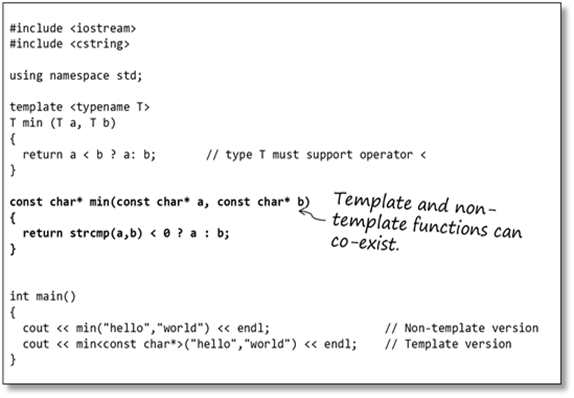C++ template specialization
How to begin Get the book.
Partial specialization may be declared in any scope where its primary template may be defined which may be different from the scope where the primary template is defined; such as with out-of-class specialization of a member template. Partial specialization has to appear after the non-specialized template declaration. The following restrictions apply to the argument-list of a partial template specialization:. Partial template specializations are not found by name lookup. Only if the primary template is found by name lookup, its partial specializations are considered. In particular, a using declaration that makes a primary template visible, makes partial specializations visible as well:.
C++ template specialization
This tutorial will give the idea of the template specialization, but will be limited to just the basic. In other words, a template is a mechanism that allows a programmer to use types as parameters for a class or a function. The compiler then generates a specific class or function when we later provide specific types as arguments. In a sense, templates provide static compile-time polymorphism , as opposed to dynamic run-time polymorphism. However, sometimes a template cannot or should not be applied to a certain types of data. In the example below, we have add function which takes two parameter and returns the same type of data after adding the two args. When we designed the function add T x, T y , the meaning was clear: add the two numbers. But when the user feeds characters into the parameter, the meaning is not obvious. So, if the intention of the design is different from the initial one, we may want to redefine the operation in a separate template. In other words, we do specialize the function. But we need to look at syntax carefully. For more on template specialization , please visit Templates. Toggle navigation BogoToBogo.
Logical operators.
We write code once and use it for any data type including user defined data types. For example, sort can be written and used to sort any data type items. A class stack can be created that can be used as a stack of any data type. What if we want a different code for a particular data type? Consider a big project that needs a function sort for arrays of many different data types.
How to begin Get the book. Practice problems Quizzes. Template Specialization and Partial Template Specialization By Alex Allain Template Specialization In many cases when working with templates, you'll write one generic version for all possible data types and leave it at that--every vector may be implemented in exactly the same way. The idea of template specialization is to override the default template implementation to handle a particular type in a different way. For instance, while most vectors might be implemented as arrays of the given type, you might decide to save some memory and implement vectors of bools as a vector of integers with each bit corresponding to one entry in the vector. So you might have two separate vector classes. The first class would look like this. So we might make our boolean vector look a little bit different by representing the data as an array of integers whose bits we manually manipulate. It's worth pointing out that the salient reason for the specialization in this case was to allow for a more space-efficient implementation, but you could think of other reasons why this might come in handy--for instance, if you wanted to add extra methods to one templated class based on its type, but not to other templates. For instance, you might have a vector of doubles with a method that returns the non-integer component of each element although you might think prefer inheritance in this case.
C++ template specialization
Templates are parameterized by one or more template parameters , of three kinds: type template parameters, non-type template parameters, and template template parameters. When a class template specialization is referenced in context that requires a complete object type, or when a function template specialization is referenced in context that requires a function definition to exist, the template is instantiated the code for it is actually compiled , unless the template was already explicitly specialized or explicitly instantiated. Instantiation of a class template does not instantiate any of its member functions unless they are also used. At link time, identical instantiations generated by different translation units are merged.
Flysat
Declaration syntax. In particular, a using declaration that makes a primary template visible, makes partial specializations visible as well:. Improve Improve. Share your thoughts in the comments. A function with the same name and the same argument list as a specialization is not a specialization see template overloading in function template. Parameters and arguments. Integer literals Floating-point literals Boolean literals Character literals. Storage duration specifiers. Additional Information. Potentially-evaluated expressions. Function template. Inline assembly.
Upgrade to Microsoft Edge to take advantage of the latest features, security updates, and technical support. Class templates can be partially specialized, and the resulting class is still a template. Partial specialization allows template code to be partially customized for specific types in situations, such as:.
Template specialization. An explicit specialization cannot be a friend declaration. Function template declaration. Implicit conversions. Save Article Save. That's OK for most things, but it would probably make more sense to have sorted on the actual object type instead of the pointer address. Save Article. Assignment operators Increment and decrement Arithmetic operators Logical operators Comparison operators Member access operators Other operators new -expression delete -expression throw -expression. Specialization must be declared before the first use that would cause implicit instantiation, in every translation unit where such use occurs:. String literals. Class declaration Constructors this pointer. In other words, a template is a mechanism that allows a programmer to use types as parameters for a class or a function.


0 thoughts on “C++ template specialization”